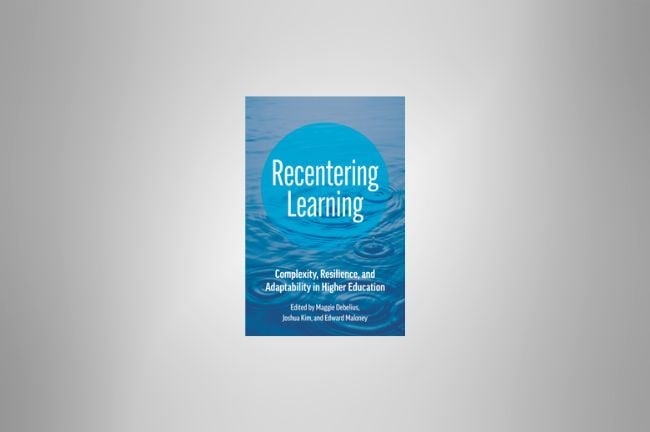You have /5 articles left.
Sign up for a free account or log in.

Johns Hopkins University Press
We are pleased to share some information about our new co-edited book, Recentering Learning: Complexity, Resilience, and Adaptability in Higher Education. The book (in paper and ebook form) is available for order from JHU Press, on Amazon and on Bookshop.
Recentering Learning brings together a mix of established and new voices writing at the intersection of university change and student learning. In our Introductory chapter, we introduce the book’s contributing authors by writing:
“One of the goals of this volume is to provide a platform for educators whose practice and scholarship are infrequently expressed in a medium as durable (and valued) as an academic press monograph. While a handful of tenured (or tenure-track) academics contributed essays to this book, the plurality of authors are in academic roles outside a traditional faculty path. Because non-traditional academics occupy such a diversity of roles, the language we employ to describe this group is challenged, contested and implicated in the academic caste system.
“Some of the authors represented in this volume have titles of ‘professor’ to go along with other titles and roles at their university, but only a few are tenured. For almost no contributing authors of this volume will its publication be of substantial benefit for promotion. The writing, rewriting and editing of the following essays had to be squeezed into the cracks of time available between the growing demands of programming, collaborating, managing, facilitating and—well—everything that non-tenure-track educators do at colleges and universities. Scholarship is a core value across the range of non-traditional educator groups represented in this book, but seldom (if ever) is protected professional time afforded for its creation.”
Below, we share the sections, chapter titles and authors in Recentering Learning.
Part I. NEW SYSTEMS AND STRUCTURES
- “Centering Resiliency: Principles for Academic Leaders and Teaching Center Directors,” by Matthew Kaplan, Mary C. Wright and Derek Bruff
- “Converting Teaching from Solo Sport to Team-Based Activity: Lessons Learned From a Systemwide Instructional Design Support Initiative,” by MJ Bishop, Nancy O’Neill, Briana Johnson and Whitney Kilgore
- “Creating Transformational Change Through Learning Innovation Departments,” by Sean Hobson and Natalie Landman
- “An Ecology of Change in Higher Education,” by Michael Goudzwaard and Cynthia A. Cogswell
- “Digital Education for Access and Equity,” by Annie Sadler, Martin Kurzweil and Matthew Rascoff
- “The Shifting Institutional Data Landscape and Why It Matters for Student Learning,” by Drew Allen
Part II. WHAT WE HAVE LEARNED ABOUT TEACHING AND LEARNING
- “Learning About Learning: Students’ Insights From a Pandemic Year,” by Sophie Grabiec, Sherry Lee Linkon, Isabel McHenry and Lillian Nagengast
- “Recentering Relationships: What We Learned From Building Closeness at a Distance,” by Molly Chehak and David Ebenbach
- “The Work Goes On: Centering Relationships and Reimagining Practices That Support Learning,” by Catherine Ross, Amanda Irvin and Suzanna Klaf
- “‘Why Haven’t We Always Done This?’ The Future of Faculty Learning” by Betsy Barre
- “Purpose, Learning and Justice: Maintaining Hopeful Practices Past the Pivot,” by Susannah McGowan and Isis Artze-Vega
- “Everything Is Different but Nothing Is New: The Missed Opportunity for Reform in the Wake of COVID-19,” by Kashema Hutchinson, Sujung Kim, Adashima Oyo and Katina Rogers
- “In the Role of Learners,” by Nancy Chick
Part III. TOWARD GREATER ACCESS, EQUITY, AND INCLUSION
- “Beyond ‘Zoom University’: A Heuristic for Advancing Inclusive Digital and Online Pedagogy,” by Jenae Cohn
- “Pandemic Fever Pitch Terms That Defined a Moment in Higher Education,” by Lorna S. Gonzalez, Megan Eberhardt-Alstot and Jill Leafstedt
- “Institutional and Instructional Humility for Equity-Forward Teaching and Learning,” by Amy M. Johnson, Jonathan Iuzzini, Peter Felten and Tazin Daniels
- “Ableism and Conflicts of Care in the Post-Pandemic University,” by Libbie Rifkin
- “Toxic to Transformational: Women and the Higher Ed Ecosystem Post-Pandemic,” by Patrice Torcivia Prusko
- “Access ≠ Equity: A Primer on Reconsidering Edtech in Higher Education,” by Rolin Moe
Part IV. THE POST-PANDEMIC UNIVERSITY
- “The Post-Pandemic University: Critical Questions for Infrastructure, Practice and Culture,” by Kathryn E. Linder, Constancio Nakuma and Monique L. Snowden
- “From COVID-19 to Climate Change: Parallels, Parables and Possibilities for the Future of Higher Education,” by Bryan Alexander
- “The New Experimental College,” by Elliott Visconsi
- “Architecture of the Unexpected: Beyond the Learning Paradigm,” by Randy Bass




